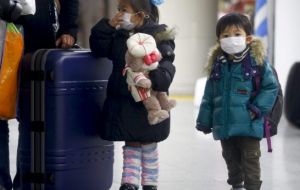MercoPress. South Atlantic News Agency
IAEA concerned about lack of radiation information from Japanese authorities
 Tokyo infants are recommended not to drink tap water
Tokyo infants are recommended not to drink tap water The International Atomic Energy Agency, IAEA has expressed growing concern about a lack of information on radiation levels and the situation at the crippled nuclear reactors from Japanese authorities.
Twelve days since the deadly quake and tsunami struck the Japanese coast, authorities advised against allowing infants to drink tap water in Tokyo due to raised radiation levels while the United States became the first nation to block some food imports from Japan
The crisis at the tsunami-smashed nuclear power plant, 250 km north of the Japanese capital, appeared far from over with workers attempting to gain control ordered to leave the site after black smoke began rising from one of its six reactors.
The plant was crippled by a 9.0 magnitude earthquake and tsunami on March 11. Some 23,000 people have been left dead or missing.
Tokyo authorities said water at a purification plant for the capital of 13 million people had 210 becquerels of radioactive iodine -- more than twice the safety level for infants.
“This is without doubt, an effect of the Fukushima Daiichi plant,” a Tokyo metropolitan government official said, referring to the nuclear power station.
Tokyo governor Shintaro Ishihara, however, said the radiation level posed no immediate health risk and water could still be used.
“But for infants under age one, I would like them to refrain from using tap water to dilute baby formula,” he said.
International concerns about food safety are growing, with the United States the latest to impose controls. The US Food and Drug Administration said it was stopping imports of milk, vegetable and fruit from four prefectures in the vicinity of the crippled nuclear plant.
Officials still insisted, however, that there was no major danger to humans and urged the world not to over react.
“We will explain to countries the facts and we hope they will take logical measures based on them,” Japan's chief cabinet secretary Yukio Edano, who has been the government's public face during the disaster, told a news conference.
Technicians working inside an evacuation zone around the plant have successfully attached power cables to all six reactors and started a pump at one to cool overheating fuel rods.
As well as having its workers on the front line in highly dangerous circumstances, TEPCO is also facing accusations of a slow disaster response and questions over why it originally stored more uranium at the plant than it was designed to hold.
Vienna-based UN watchdog, the International Atomic Energy Agency (IAEA), expressed concern about a lack of information from Japanese authorities. It cited missing data on temperatures of spent fuel pools at the facility's reactors 1, 3 and 4.
“We continue to see radiation coming from the site ... and the question is, where exactly is that coming from?” said a senior IAEA official, James Lyons.
Worsened by widespread ignorance of the technicalities of radiation, public concern is rising around the world and radioactive particles have been found as far away as Iceland.
Experts said tiny traces of radioactive particles, measured by a network of monitoring stations as they spread eastwards from Japan across the Pacific, North America, the Atlantic and to Europe, were far too low to cause any harm to humans.
“It's only a matter of days before it disperses in the entire northern hemisphere,” said Andreas Stohl, a senior scientist at the Norwegian Institute for Air Research.




Top Comments
Disclaimer & comment rules-

Read all commentsOne has to ask, why is the International Atomic Energy Agency sitting on its hands in Geneva when the real action is in Japan?
Mar 24th, 2011 - 12:20 pm 0Surely a supra-national agency has supra-national rights and supra-national responsibilities when it is a matter that affects the contamination of much of the Northern Hemisphere.
Or is the IAEA yet another useless and toothless quango/ONG?
Commenting for this story is now closed.
If you have a Facebook account, become a fan and comment on our Facebook Page!